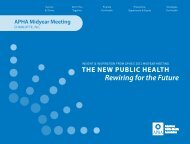EVIDENCE
missingevidence-digitalpdf-singlepages_2016
missingevidence-digitalpdf-singlepages_2016
You also want an ePaper? Increase the reach of your titles
YUMPU automatically turns print PDFs into web optimized ePapers that Google loves.
Allowing reanalysis of sensitive data<br />
4.21 HM Revenue & Customs’ Data Lab and the Department for Education’s National Pupil Database give<br />
approved researchers access to sensitive data, which the researchers can then analyse and publish.<br />
The Education Endowment Foundation publishes in a way that allows researchers to reanalyse<br />
the results from their trials. Such systems ensure that personally sensitive data can be used.<br />
Principles and recommendations<br />
4.22 In the light of the material summarised in this report, the following broad principles are commended:<br />
1. Prompt and full publication of government research is a matter not of contract but of public<br />
duty. While research contracts will necessarily vary in their provisions, all contracts should<br />
spell out this obligation of principle, which reflects the departmental rules governing<br />
external research.<br />
2. No redactions should be made in published research except for verifiable legal or security<br />
reasons such as data protection or national security.<br />
3. Save in wholly exceptional circumstances, publication of external research should precede or,<br />
at latest, accompany promulgation of any policy initiative which is presented as dependent on it,<br />
or which clearly is intended to be.<br />
4. Conflict with current or impending policy initiatives is not an acceptable reason for delaying<br />
or withholding publication of external research. In such situations government should<br />
be prepared to publish its reasons for disagreement and let any debate be aired in public.<br />
5. Government and researchers should adopt more of the practices described in the preceding<br />
paragraphs in commissioning, conducting and communicating problematical research.<br />
4.23 The recommendations that follow seek to avoid any measures that would inhibit ministers and civil<br />
servants from commissioning in the first place research into politically sensitive issues or research that<br />
might generate awkward findings. Even so, it is recognised that there will be occasional research that<br />
cannot be published (or cannot be published in full), for example for reasons of national security.<br />
Recommendation I<br />
A standardised central register of all externally<br />
commissioned government research<br />
Building on existing departmental research databases, the government should institute<br />
a system in which:<br />
(a)<br />
(b)<br />
A searchable list of commissioned external research is published and maintained, including:<br />
who is commissioning and conducting the research, what is being measured, what methods<br />
are being used and what outcomes are expected; and a timetable for completion, peer review<br />
and publication of the research.<br />
Each study has a unique identifier that conforms to open data standards, so that any<br />
amendments to these fields during the course of the research can be tracked and will<br />
be accompanied by an explanation, is linked to associated data sets and is associated<br />
with comprehensive meta data. Consideration should be<br />
given to these issues in future discussions about detail of<br />
a register of research.<br />
Prompt and full publication<br />
of government research<br />
is a matter not of contract<br />
but of public duty.<br />
SECTION 4: REMEDIES AND RECOMMENDATIONS<br />
34



